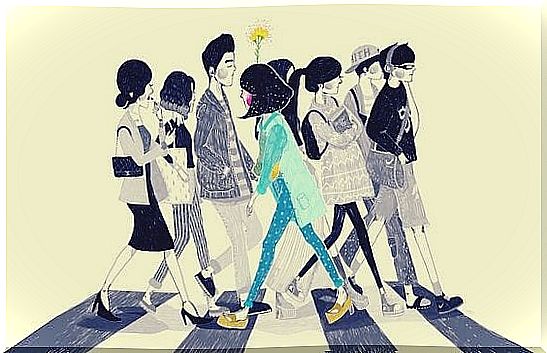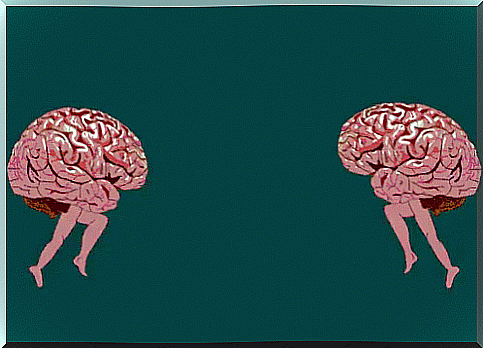There Are Attitudes That Separate More Than The Distances Themselves

There are attitudes that separate with as much distance as a cold ocean. It doesn’t matter if it’s that person we live with or that co-worker we see every day. Their rigid patterns, inflexible thoughts and peremptory values set up walls, fences and emotional traps that seriously disturb our environments.
As we often say, what counts in our social and emotional relationships, far beyond words, is undoubtedly attitude. There are few dimensions as basic as they are interesting in the field of psychology than the processes that create it. As Thurstone once said, attitudes are like a chaotic amalgamation through which biases, preconceptions, fears, evaluations and determined tendencies towards action come together.
It should also be noted that the study of attitudes is one of the most classic disciplines in the world of psychology. However, its progress over the last decades has shown us that it is our attitudes that lead us to a happier lifestyle or, on the contrary, to that existential complexity within which we see, on a daily basis, more conflicts as opportunities.
In fact, there is one aspect that we are all used to seeing on a daily basis. In our closest circles, there are always certain people who, through their attitudes and their ways of thinking or acting according to them, simplify or make cohabitation more difficult. These psychological dimensions find expression in social contexts and, therefore, no one is immune to them. What is more, they sometimes act as seeds for sowing misfortune and as the detonators of genuine conflicts.

The different types of attitudes we need to know
Viktor E. Frankl once said: “you can take everything away from human beings, except the last of freedoms: the attitude with which they will face a given circumstance”. All of this prompts us to conclude that few tools are as basic and wonderful as the power of our attitudes. However, we must be able to count on a constructive, flexible and healthy point of view in order to be able to survive better in this sometimes complex and contradictory world.
One of the first questions that comes to mind is undoubtedly: how are attitudes formed and how are they integrated in us? It is interesting to know that attitudes are learned. During our childhood, we “absorb”, very often without paying attention, many values, interpretations and attributions transmitted by our family.
However, there comes a time when many of us change them. We do this because of our experiences or these interactions in the different social environments where we move and where we begin to relativize a lot of ideas that had been taught to us.
Not all attitudes facilitate cohabitation
We said that at the beginning. Attitudes sometimes act as sources of conflict by creating sometimes indelible distances between us. There are people who always base themselves on a defensive attitude, others who are very resistant to change and base their interactions on prejudice and some, of course, who hint at a substrate based on narcissism, on selfishness. .
Now let’s study the types of attitudes that we can find on a daily basis:
- Disinterested or conciliatory attitudes. This is the most positive attitude, which facilitates cohabitation the most. It is based on qualities such as availability, openness, acceptance and concern. Through it, we always try to achieve mutual benefit.
- Manipulative attitudes. In this case, we certainly find the classic people who pursue a single goal: their own well-being. Every behavior and every word will be based on the most cryptic deception to achieve a specific end.
- The interested attitude. Some people have different needs and needs. Therefore, each of their actions will be aimed at overcoming this distressing situation and they will seek to attract attention or victimize themselves.
- The aggressive attitude. In this case, we are faced with profiles who like to mark distances in an impertinent way, letting themselves be carried away by their prejudices and by these often aggressive values which normally create a lot of problems.

Four attitudes necessary to be happier
Positive psychology reminds us that happiness depends on several factors. One of them is found in genetics, another in our personal situation (social context, education, work, relationships, health…) and the last, considered as the most important of all, refers to our attitudes.
Therefore, and this is a topic we can reflect on, it helps to know the attitudes that we should integrate into our daily lives to begin to spot changes. Here they are :
- Take a more positive view about the behavior of those around you. Realize that others cannot always act the way we want them to and therefore we have to accept them as they are by focusing more on ourselves.
- Apply a more positive outlook on the future and all that is left for you to live. Try to be confident in yourself and in what tomorrow has to offer.
- Stop focusing on what you need to be happy. Very often, what you really need is already inside you.
- Develop stronger self-confidence. Be the protagonist of your life and the ultimate responsible for your happiness.

To conclude, as we have seen, the field of study of attitudes is as broad as it is enriching. So, and while it is true that it can be extremely complicated to live with people who adopt somewhat hostile attitudes, the key will always be to safeguard our own.
Because, at the end of the day, it is our attitudes that make us taller, that bring us closer to happiness and that will protect us every moment.
Images of Katrin Honesta









